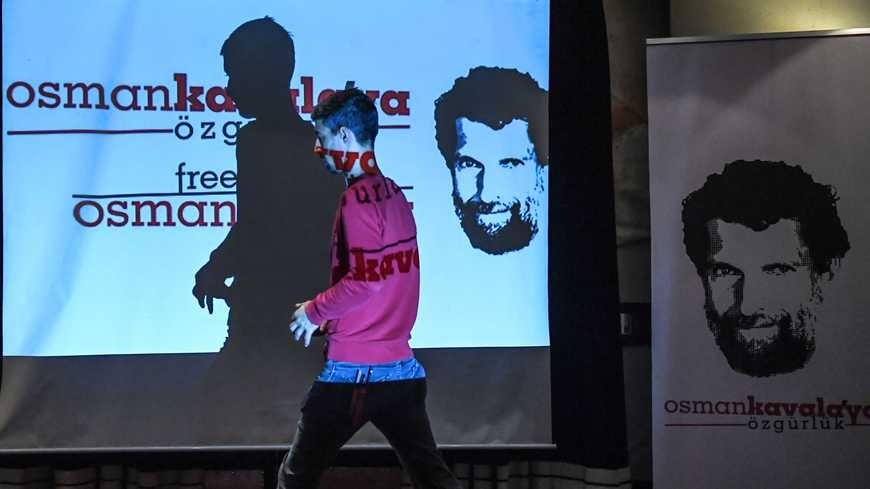Turkish Justice Minister Abdulhamit Gul spoke out against the widespread practice of arbitrary detentions Friday, fueling speculation that Turkish philanthropist and civic activist Osman Kavala, who has been in jail for more than three years on a slew of outlandish charges, may be finally freed.
Addressing a symposium on criminal law in Ankara, Gul said that defendants should stand trial without being detained and that this was the norm. “The evidence has been gathered, there is no risk of flight, the suspect’s whereabouts have been established, years have gone past. One cannot say ‘Let’s arrest [them].’ It’s wrong,” Gul said.
His comments coincided with Turkish President Recep Tayyip Erdogan’s announcement at a different venue that Turkey was entering “a new period of reforms in the economy and the judiciary in our country.”
Conjecture over Kavala’s possible release grew when a letter marked “urgent” from the Council of Judges and Prosecutors to the Istanbul court dealing with his case was leaked to the media Friday. It asked for records of all of the rulings cited by the Strasbourg-based European Court of Human Rights as having violated Kavala’s rights.
The letter seen by Al-Monitor and dated Nov. 11 was signed by an investigating judge whose name was obscured.
But Mehmet Yilmaz, the deputy chairman of the Council of Judges and Prosecutors, released a statement via Twitter saying the letter was “routine” bureaucratic procedure and that similar letters had been sent out in line with a new evaluation process for the promotion of judges and prosecutors. This includes assessing whether their work triggered European Court of Human Rights rulings against Turkey. The letter did not pertain “to a single case,” Yilmaz observed.
Why it matters: In December 2019, the European Court of Human Rights ordered Turkey to free Kavala when the court found that his lengthy detention without conviction was unlawful. Ankara turned a deaf ear even though the court’s rules are binding. In October, an Istanbul court accepted yet another absurdly evidenced indictment against Kavala claiming he sought to overthrow the government in cahoots with Western co-conspirators. The purpose was to justify his continued imprisonment, rights groups say. Kavala is due to appear in court again Dec. 18.
Freeing Kavala would be part of a “reset,” which saw Erdogan’s son-in-law Berat Albayrak lose his seat as economy minister this week, or so the line being quietly pushed by Albayrak’s enemies within Erdogan’s close circle goes. They are said to include Bilal, Erdogan’s youngest son, whose network of fellow graduates from the Kartal Muslim clerical training school in Istanbul is poised to benefit from Albayrak’s ouster.
Albayrak earned legions of foes with his brashly arrogant style and was effectively scapegoated for Turkey’s economic meltdown, which saw the currency shed over 30% of its value this year. The Turkish lira rallied against the dollar following the news of his ejection rising by 7% since hitting a record 8.58 per dollar Friday. Erdogan, a notorious micro-manager, was supposedly unaware of the ruin Albayrak had wreaked on the economy.
What’s next: Those claims will be put to the test when the Central Bank convenes Nov. 19 to discuss fiscal policy. Erdogan’s aversion to higher interest rates and his unremitting pressure on the Central Bank to keep them down is cited as one of the main reasons for the lira’s poor health.
The erosion of the rule of law under Erdogan’s authoritarian grip is another reason foreign investors have been fleeing in droves. Kavala’s release might augur change but there are thousands of other lesser-known victims of the arbitrariness of Turkey’s justice system who are rotting in jail.
Yilmaz’s comments suggest that there will be resistance from hard-liners who are pushing for Kavala’s continued detention along with that of Selahattin Demirtas, the former co-chair of the Peoples’ Democratic Party.
Erdogan has publicly endorsed many of the charges being leveled against Kavala. Yet Erdogan has proven to be endlessly pragmatic when his own survival is at stake. Will Turkey hence mothball Russian made S-400 missiles to avoid potential sanctions from a less pliant Biden administration? Will it de-escalate tensions in the eastern Mediterranean to placate the European Union? And will Erdogan seek the support of the Kurds once again? In short, will the same government that cemented authoritarianism over the past 18 years dismantle it now? Ultimately, however, the biggest question isn’t whether or not Erdogan will embark on a genuine reset. It’s whether any amount of change will prove enough to help Erdogan avert his son-in-law’s fate.
Know more: See Ayla Jean Yackley’s deep dive into the Osman Kavala case here, and for the latest on Turkey’s wobbly finances read Mustafa Sonmez’s latest.
By: Amberin Zaman
Source: Al-Monitor



